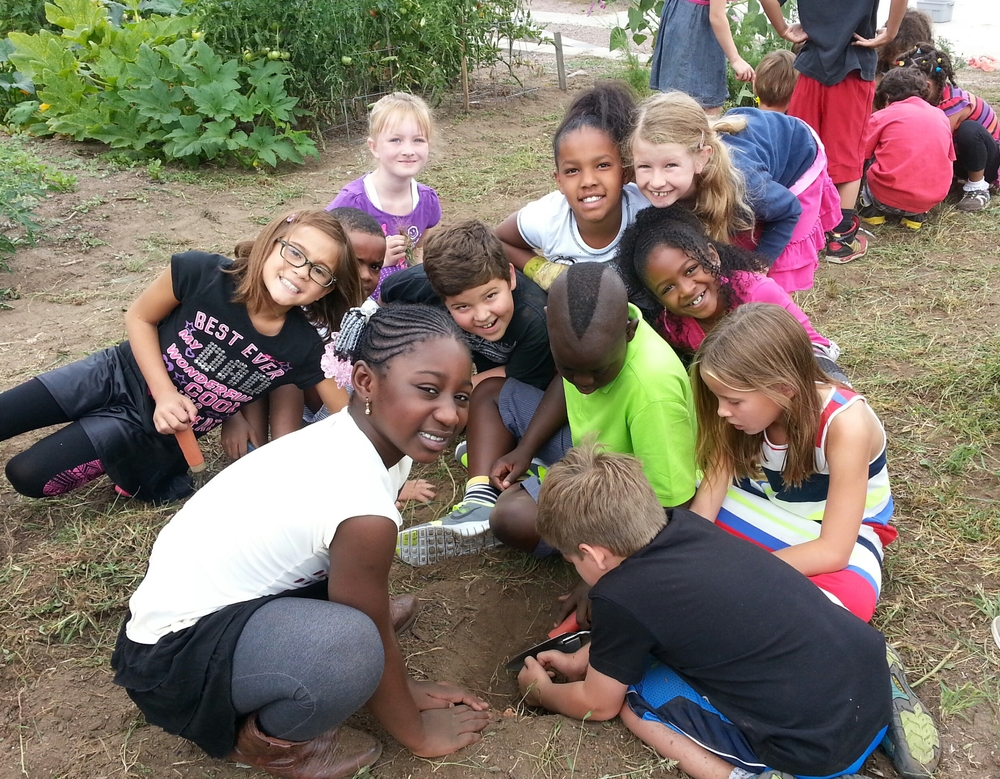EfS in Schools: Denver Green School

Today, we’d like to introduce you to the Denver Green School (DGS), a public neighborhood K-8 school now in its seventh year. DGS, located in a diverse urban setting, is one of Denver’s “Innovation” schools. These schools create their own unique program design with waivers from certain state and district rules. Recently, DGS was among four schools granted even more autonomy through the approval of a new “Innovation Zone”.
DGS has a mission of providing “a hands-on, brains-on experience that includes all students, staff, families and community, preparing all learners to lead the way toward a sustainable, bright green future.” Shared leadership and real world learning opportunities allow the school to successfully integrate Education for Sustainability (EfS) into its core curriculum. A U.S. Department of Education Green Ribbon School, DGS has also been recognized for its academic success, school culture and community partnerships. The school emphasizes environmental, economic and social sustainability and strives to reduce its ecological footprint. It has a thriving urban farm and gardens that serve as learning laboratories and provide food for students and the community. With its solar panels, solar tubes and energy monitoring, DGS has been able to cut its energy usage by half since its inception. A student-run water conservation effort proposed by the sixth grade science curriculum in the early days of the creation of the school saved an incredible one million gallons of water per year.
A Strong Foundation for Innovation
The DGS’s partnership with The Cloud Institute began even before its doors opened in 2010. The school’s founders were committed to designing the school’s model, curriculum and staff training around the EfS standards and mental models. From 2009 to 2015, Jaimie worked with DGS, providing professional development, administrative planning, onsite and remote coaching and more. “Our work with The Cloud Institute laid the EfS foundation for our students, staff and the community as a whole,” stated Dr. Mimi Diaz, one of DGS’s founding Lead Partners. The early focus on teacher development and an integrated curriculum has yielded meaningful results. “Kids that started here in their K-3 years speak the language of EfS and are able to demonstrate its foundational components,” said Diaz. “We see changes in what the kids eat and their knowledge around healthy systems and food. They are more cognizant of how we use and give back to the resources in the building and at home.”
Meaningful Outcomes
Over time, school leaders have seen the curriculum deepen through expansion of interdisciplinary units and opportunities for real-world learning. Their goal? “As the kids leave our 8th grade, we want them to be able to talk about, share and demonstrate their understanding of an environmentally, socially and economically sustainable future,” declared Diaz. They are making great strides. “I think at this point, our shining star is our 6th grade,” Diaz said proudly. “The curriculum centers around community justice, is truly project based, interdisciplinary and what we call ‘hands-on, brains-on’. The EfS standards are connected with the learning activities, the assessments and Common Core Standards.”
Maintaining Progress Takes Work
Progress does comes with its share of challenges and DGS is no exception. As new staff join the team, professional development is key to maintaining a shared understanding of EfS. Diaz explained, “Ongoing professional development is vital to keep people up to speed and digging deeper into their knowledge of mental models, to be able to live them and consciously be able to assess adults and students around all the pieces. We’re getting there, but there’s still a long way to go.” She acknowledges the struggle to stay connected to The Cloud Institute as budgetary constraints seemingly limit the ability to pay for outside consultants. Still, Diaz is grateful for the early partnership with The Cloud Institute, “The EfS standards and performance indicators remain the foundation of what our mission, vision and values are all about. The Cloud Institute offers resources and professional development that no one else has. We wouldn’t be where we were without them.”
An Eye for the Future
No longer at DGS, Diaz is philosophical about her time there, “When I was thinking about moving on and helping the school visualize what needs to happen in the years to come, the questions we asked included, “How will we adjust our thinking as needed? What will we preserve and change and how will we make decisions? How can we ensure that we make a conscious effort to keep asking those and new questions as we learn and grow? This shift of thinking needs to continue with others for our original vision to come true.”
And with almost all students meeting or exceeding state standards and over 95% of staff returning for the 2016-17 school year, it appears they are well on their way!
Read more about The Denver Green School here. Its EFS Standards Alignment Map for 2nd grade is available in The Cloud Institute’s Curriculum Design Manual, available on our website. Photo credit: Denver Green School
